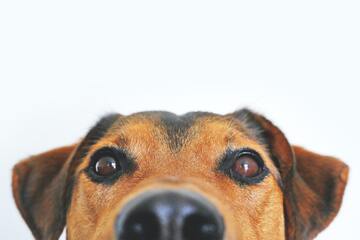The holiday season is upon us, and with holiday celebrations comes holiday food! If you have a dog at home, they’re probably just as excited about it as you are. All the smells of cooking, baking, and reheating leftovers are tantalizing to a dog. You may be tempted to share some holiday food with your pup, so here’s a guide to help you determine which food is OK for your dog and which foods to avoid.
Holiday foods that are dangerous for dogs
These foods should be avoided even in small quantities. The foods on this list can be harmful to dogs and can result in everything from digestive issues to death.
Grapes and raisins
Grapes and raisins can lead to kidney failure in dogs. Even in small amounts, grapes and raisins can be harmful to dogs. During the holidays, be aware of party trays that contain grapes and desserts that contain raisins.
Chocolate
Dark chocolate is more dangerous than milk chocolate, and milk chocolate is more dangerous than white chocolate. However, all three of them contain harmful levels of methylxanthines which can cause a variety of health issues in dogs, including death. If your dog does eat chocolate, especially if they eat dark chocolate or baker’s chocolate, call your veterinarian or the Pet Poison Helpline immediately.
Anything with garlic or onions (including chives)
Whether raw or cooked, garlic and onions can lead to red blood cell damage in dogs if they eat enough of it. They can become anemic and develop severe problems including elevated heart rate, weakness, and ruptured red blood cells. The symptoms can be delayed, so monitor your dog for a few days if they’ve gotten into garlic or onions.
Turkey or chicken bones
Bones can splinter and become a choking hazard. They can also puncture the dog’s digestive tract. Dogs can have turkey or chicken meat, but not the bones.
Alcohol
Alcohol essentially has the same effect on dogs as it does on humans, but it takes a lot less alcohol to be harmful to a dog. Alcohol can lead to disorientation, digestive problems, liver problems, and even death.
Anything containing Xylitol (an artificial sweetener)
Xylitol is a common ingredient in many “sugar-free” foods. For dogs, it can cause an unnecessary insulin release which can lead to numerous health problems, including death.
Salty snacks
Eating too many salty snacks can cause health problems for your dog. Reactions range from digestive issues like vomiting and excessive urination to severe issues like seizures or death. While it might be tempting to give your dog chips and crackers throughout the holidays, look for salt-free foods instead.
Sugary Desserts
Sugar causes the same problems for dogs that it causes for people. It can cause digestive issues, weight gain, dental problems, and can lead to diabetes. Avoid giving your dog sugary treats over the holiday season.
Tree nuts
Some tree nuts are more dangerous for dogs than others. A few tree nuts contain toxins that can be extremely harmful to dogs, but others are OK in small amounts. In all cases, tree nuts are high in fat and calories, so dogs should not eat too much of them. Fat and calories can accumulate quickly in dogs and can cause digestive issues and problems associated with weight gain.
- Almonds – No. Almonds can break into shards if your dog doesn’t chew them all the way and can scratch or tear the digestive tract. A little unsalted almond butter can be OK as a treat.
- Cashews – Yes, if they’re unsalted. A few cashews can make a nice treat for your dog.
- Macadamia nuts – NO! These are extremely poisonous for dogs and can damage the nervous system. Macadamia nuts are toxic for dogs, even in small amounts.
- Pecans – Yes, if they’re unsalted and unsweetened they can make a nice treat for your dog.
- Pistachios – No, they can be a choking hazard for dogs.
- Walnuts – Yes, if they’re English walnuts (the kind of walnut you usually find in a store). However, dogs cannot eat Black walnuts – a type of walnut most often found in the wild. Black walnuts are toxic to dogs and can lead to digestive problems, fever, and seizures.
Holiday foods that are OK for dogs
There are numerous human foods that are OK for dogs to eat. While some of them contain more nutritional value than others, the foods on this list are safe for your dog to eat in small quantities. Keep in mind over the holiday season that, just like us, too much new food can lead to an upset stomach. If your dog does not typically eat these foods, only give them a little bit as a treat.
Vegetables that are OK for dogs:
- Sweet potatoes
- Carrots
- Green beans
- Brussels Sprouts. Brussels sprouts might cause some gas, but they are OK for dogs in small amounts.
- Corn. Corn on the cob is not good for dogs, but corn is OK for dogs once it’s been removed from the cob.
Fruit that is OK for dogs:
- Apples. Remove the core and seeds before giving apple pieces to your dog.
- Pears. Once the pit and seeds are removed, fresh pears are OK for dogs.
- Peaches. Fresh peaches with the pit removed are OK for dogs.
- Oranges. Many dogs don’t like oranges, but they are OK for dogs if they have been peeled.
- Cranberries. Fresh or dried, cranberries are OK for dogs in small amounts.
Meat that is OK for dogs:
- Turkey or chicken. Remove the bones, skin, and fatty bits before giving poultry to your dog.
- Ham. It is OK for dogs to eat small amounts of ham. Ham tends to be fatty and salty, so only give them a little bit as a treat.
- Pork. If it is salty, only give them a little bit as a treat. Remove all bones and fatty bits first.
Other holiday food that is OK for dogs:
- Peanuts and Peanut butter. Raw and unsalted peanuts or peanut butter is best. Because they are fatty and high in calories, peanuts and peanut butter are best as a treat.
- Plain bread (no spices, raisins, etc.). It is OK for dogs to eat plain bread in small amounts. However, it won’t provide any nutritional benefit like vegetables or fruit would. Bread should be used more like a treat and should be given sparingly.
- Cheese. Unless your dog is lactose intolerant, they can have cheese. Too much cheese can lead to digestive problems, so only give them a little bit as a treat.



Recent Comments